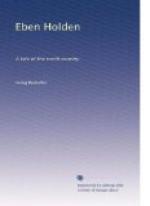He laughed heartily at this example of fervid eloquence, and then we rose from the table. He had to go to the office that evening, and I came away soon after dinner. I had nothing to do and went home reflecting upon all the great man had said.
I began shortly to see the truth of what he had told me — men licking the hand of riches with the tongue of flattery men so stricken with the itch of vanity that they grovelled for the touch of praise; men even who would do perjury for applause. I do not say that most of the men I saw were of that ilk, but enough to show the tendency of life in a great town.
I was filled with wonder at first by meeting so many who had been everywhere and seen everything, who had mastered all sciences and all philosophies and endured many perils on land and sea. I had met liars before — it was no Eden there in the north country — and some of them had attained a good degree of efficiency, but they lacked the candour and finish of the metropolitan school. I confess they were all too much for me at first. They borrowed my cash, they shared my confidence, they taxed my credulity, and I saw the truth at last.
‘Tom’s breaking down,’ said a co-labourer on the staff one day. ‘How is that?’ I enquired.
‘Served me a mean trick.’
‘Indeed!’
‘Deceived me,’ said he sorrowfully.
‘Lied, I suppose?’
‘No. He told the truth, as God’s my witness.’
Tom had been absolutely reliable up to that time.
Chapter 36
Those were great days in mid autumn. The Republic was in grave peril of dissolution. Liberty that had hymned her birth in the last century now hymned her destiny in the voices of bard and orator. Crowds of men gathered in public squares, at bulletin boards, on street corners arguing, gesticulating, exclaiming and cursing. Cheering multitudes went up and down the city by night, with bands and torches, and there was such a howl of oratory and applause on the lower half of Manhattan Island that it gave the reporter no rest. William H. Seward, Charles Sumner, John A. Dix, Henry Ward Beecher and Charles O’Connor were the giants of the stump. There was more violence and religious fervour in the political feeling of that time than had been mingled since ’76. A sense of outrage was in the hearts of men. ‘Honest Abe’ Lincoln stood, as they took it, for their homes and their country, for human liberty and even for their God.
I remember coming into the counting-room late one evening. Loud voices had halted me as I passed the door. Mr Greeley stood back of the counter; a rather tall, wiry grey-headed man before it. Each was shaking a right fist under the other’s nose. They were shouting loudly as they argued. The stranger was for war; Mr Greeley for waiting. The publisher of the Tribune stood beside the latter, smoking a pipe; a small man leaned over the counter at the stranger’s elbow, putting in a word here and there; half a dozen people stood by, listening. Mr Greeley turned to his publisher in a moment.




